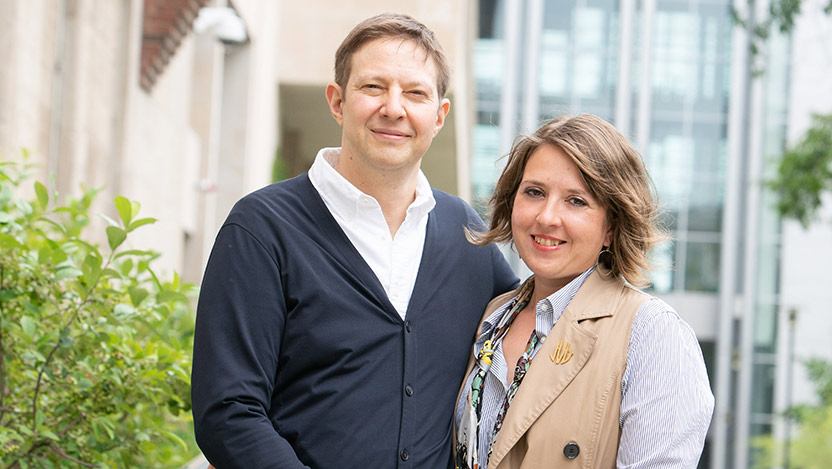Transplant gives patient with alcohol-induced liver failure a second chance

Eric Tanis had never been one to proactively seek health care. Even when his skin began to take on a yellow hue and he felt increasingly exhausted, he didn’t want to see a doctor. It was his wife, Jillian Van Volkenburgh, who finally convinced him to go to a local hospital emergency room that December in 2018.
There he learned news that changed everything: He was in end-stage liver failure and without a liver transplant, he would die.
Tanis, however, said he could not be put on the hospital’s transplant wait list because at the time, he’d only been sober for a handful of days.
“I was put into palliative care and told there was nothing they could do,” recalled Tanis, 43, of Gary, Indiana.
Alcohol use disorder (AUD) is a complex medical disease in which individuals are unable to stop or control their alcohol use despite experiencing substantial harm or distress due to their pattern of drinking. AUD is the medical term given to alcoholism — a term no longer used by the medical community to describe what is now recognized as a neurological disorder (patients with AUD can experience functional changes in their brain, as well as structural changes that are visible on medical imaging).
The severity of a patient’s AUD is based on how many symptoms they have, like craving alcohol, experiencing withdrawal symptoms when not using alcohol, or persistently wanting or trying to reduce the amount of alcohol they use.
Many liver transplant centers require patients with AUD and liver failure to stop drinking for six months before they can be eligible for a new liver. This policy is based on a belief that patients will be less likely to relapse after their transplant, jeopardizing a life-saving treatment in high demand. In 2019, more than 1,200 people succumbed to liver failure while awaiting a transplant.
For the sickest patients with alcohol-related hepatitis, six months can be a death sentence. Furthermore, recent research suggests sobriety alone does not determine a transplant’s success.
Research suggests the rate of alcohol relapse is no different in liver transplant patients with six months of sobriety than in patients who aren’t sober.
“Over the decades, six months of sobriety was an arbitrary period set forth in the literature that was not steeped in hard data,” said University of Chicago Medicine transplant hepatologist and Living Donor Liver Transplant Program co-director Anjana Pillai, MD. Along with transplant surgeon John Fung, MD, PhD, Pillai spearheaded the development of the institution’s current policy on expedited liver transplant for alcoholic hepatitis.
A Newer research suggests the rate of alcohol relapse is no different in liver transplant patients with six months of sobriety than in patients who aren’t sober. As a result, some hospitals have begun to carefully revise how they determine whether a patient with alcohol-induced liver failure should receive a new liver. Increasingly, transplantation is being seen as one step in a journey that also involves mental and physical rehabilitation.
“The idea is to identify patients who are the least at risk for relapse through a specific criteria,” said Pillai. “And the transplant is one aspect of their cure, but there’s definitely an emotional and psychological aspect that will need long-term care.”
Tanis knew of UChicago Medicine's reputation and quality of care, and its proximity to his home. So a day after being released from the hospital in Indiana, he and Jillian drove to the medical center, where doctors undertook a holistic review of his case.
They determined it was Tanis’ first time being hospitalized for liver failure and that transplantation was the only treatment that could save him. There were other factors that increased his chance of being put on the transplant wait list: He was otherwise healthy, he had a strong support system – the perpetual presence of Jillian in his hospital room was proof of that – and he had insight about and took ownership of his AUD.

“I often ask patients point blank, ‘Why do you think you have liver disease?’” said Sonali Paul, MD, the hepatologist who treated Tanis. “Both Eric and Jillian were upfront about his alcohol use disorder.”
The multidisciplinary transplant review team that included doctors and a social worker agreed to put Tanis on the wait list. In late January 2019, Tanis was matched for a new liver. He stayed for about two weeks in the hospital after the transplant, but it took roughly a year to feel like himself again.
“There’s a great deal of responsibility that I feel about this gift I’ve been given,” said Tanis. “It’s kind of cliché, but it was the best day of my life because I got this gift — but it was also the worst day of someone else’s life, because someone had to die in order for me to receive it.”
It's important for people with alcohol-induced liver failure to know that it doesn’t have to be hopeless.
Tanis believes most people still do not understand AUD or the evolving approach to transplanting patients with alcohol-induced liver failure, which he recognizes is a complicated issue.
He hopes that by participating as a member of the patient affairs committee for the U.S. transplant system, the Organ Procurement and Transplantation Network, he can help raise awareness about the realities of overcoming AUD and liver failure.
“I think there’s this preconceived notion that addicts in general have no will power,” said Tanis. “That’s probably the farthest thing from the truth.”
Today, Tanis is back to working full time at his family’s clothing store. He completed his degree in political science last year, and is now studying for a Master of Business Administration.
“I think it's important for people (with alcohol-induced liver failure) to know that it doesn’t have to be hopeless,” said Tanis. “No one is without value. When you’re laid up and don't have the ability to take care of yourself, you lose your self-sufficiency. It's hard to keep your dignity. But I was treated respectfully, and I'm eternally grateful for that."

Anjana Pillai, MD
Anjana Pillai, MD, is a board-certified gastroenterologist and transplant hepatologist who specializes in the management of chronic liver diseases. Dr. Pillai is the medical director of the multidisciplinary liver tumor program, which encompasses multiple specialists with expertise in benign and malignant tumors of the liver.
See Dr. Pillai's profile
Sonali Paul, MD
As a hepatologist, Sonali Paul, MD, specializes in the care of patients with liver disease. She specializes in treatment for hepatitis B, autoimmune and cholestatic liver diseases and liver transplantation.
See Dr. Paul's physician profileLiver Transplant Program
With the most established and experienced liver transplant program in the Midwest, our experts offer patients a leading-edge approach to diagnosing and treating chronic and acute liver diseases.
Learn more about our transplant program